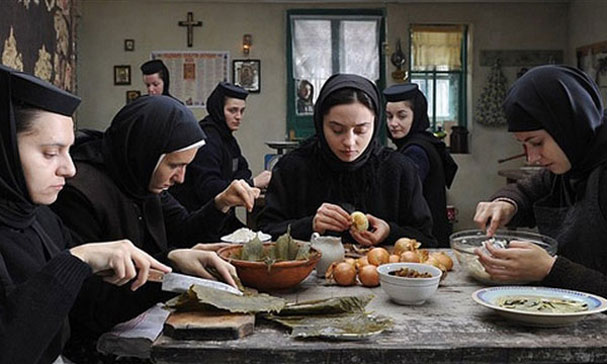
“Anyone who perked up at the word “exorcism” beware: Beyond the Hills is many things, but it’s not a horror movie, and little of the rite occurs on-screen. It’s a somber drama about how outmoded ways of thinking warp morality — and there’s not a demon or a jump-scare in sight.” –Robert Gifford
Beyond the Hills is about people stuck between the old world and the new. Set in a modern-day Romanian monastery that looks as though it has barely changed since the 18th century, the characters and the world around them are caught between tradition and modernity – a cop talks of witchcraft while tapping away on a laptop; a doctor recommends prayer while prescribing antipsychotic medication.
The film is writer-director Cristian Mungui’s (Tales from the Golden Age) full-length follow-up to the superb 4 Months, 3 Weeks and 2 Days, and similarly, it centers on a pair of female friends trying to survive in an oppressive, patriarchal society.
The central pairing consists of Alina (newcomer Cristina Flutur) and Voichita (Cosmina Stratan, also making her film debut), two estranged childhood friends. After the two grow up together in an orphanage, Alina sets off for Germany while Voichita becomes a nun. Their reunion, at a Romanian train station where Alina has arrived to stay with her friend, opens the film.
It becomes increasingly clear, however, that Alina is deeply mentally ill, and her disruptive moodiness leads her to clash with the head of the monastery (Valeriu Andriuta, Milionari de weekend ), who simultaneously embodies the gentler and most restrictive aspects of Christianity.
That duality is indicative of the way Mungui treats his characters — everyone is a little bit right and a little bit wrong. While they do end up harming one another, it’s more out of misguidedness than malice.
The first half of the film mostly consists of mumbled conversations shot in static long takes, an austere style that recalls The Forgiveness of Blood and Of Gods and Men. The slow pace is redeemed by revealing, if muted, character moments and Mungui’s exquisite framings. The first and last shots of the film are early contenders for best of the year.
The narrative does eventually come to a point. After hospitalizing Alina and attempting to dump her with a foster family both fail and her condition worsens, Papa begins to push for an exorcism, which sends the film rocketing out of the doldrums and into an increasingly distraught final hour.
Anyone who perked up at the word “exorcism” beware: Beyond the Hills is many things, but it’s not a horror movie, and little of the rite occurs on-screen. It’s a somber drama about how outmoded ways of thinking warp morality — and there’s not a demon or a jump-scare in sight.
And thank god for that. Though Mungui has crafted a film far too dour and sparse for mainstream audiences, it’s a gem for the self-selected few who appreciate a thoughtful, quietly devastating foreign film.



